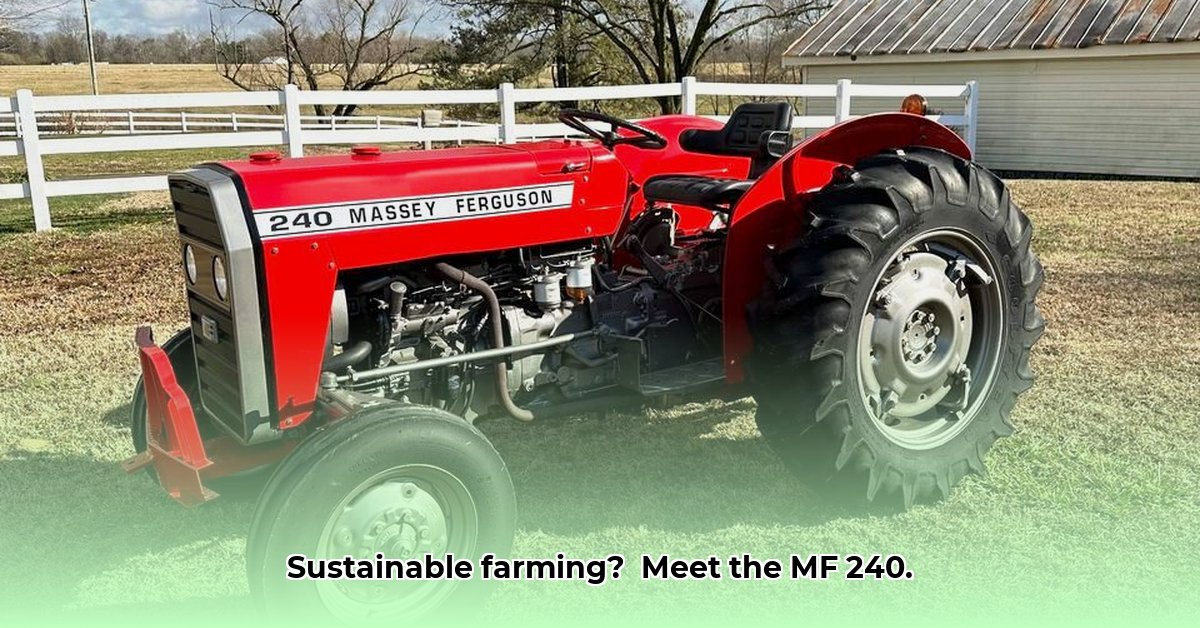
MF 240 Tractor: A Case Study in Sustainable Agriculture for Small Farms
The Massey Ferguson 240 tractor, a workhorse from a previous generation, is experiencing renewed interest in the context of sustainable agriculture. This case study examines the MF 240's suitability for small-scale farming, weighing its advantages and disadvantages against modern alternatives. We explore its durability, affordability, and fuel efficiency, analyzing its impact on various stakeholders and assessing its alignment with contemporary trends towards sustainable practices. For more detailed specifications, see the MF 240 specs.
Durability and Longevity: A Legacy of Reliability
The MF 240's exceptional durability is a cornerstone of its appeal. Built with robust, simple mechanics, it boasts a significantly longer lifespan than many modern tractors. This longevity translates directly into reduced environmental impact: fewer tractors need manufacturing, resulting in lower demand for raw materials, less energy consumption during production, and diminished waste from disposal. Isn't a machine that lasts decades a powerful argument for sustainability? This inherent durability contributes significantly to the overall lifecycle cost analysis.
Accessibility and Affordability: Empowering Small-Scale Farmers
The MF 240's affordability is a game-changer for resource-constrained small farms. Its lower purchase price compared to modern tractors makes it an accessible option. Moreover, the relative simplicity of its design makes maintenance and repairs more manageable, often requiring less specialized knowledge and fewer expensive parts. This reduced operational cost contributes significantly to the financial viability of sustainable farming practices. How many small farms are hindered by the prohibitive cost of new equipment?
Fuel Efficiency: Balancing Efficiency with Workload
While the MF 240's fuel efficiency is commendable for its era, it is crucial to acknowledge the trade-off with its lower horsepower compared to modern machines. This translates to potentially longer working hours for the same tasks. However, this can inadvertently encourage more efficient farming practices, leading farmers to optimize their workflows to minimize fuel usage and maximize output. Isn't this a compelling case of a machine's limitations fostering resourcefulness? The inherent lower power necessitates careful planning and efficient operation.
Stakeholder Impact: A Multifaceted Perspective
The MF 240's influence extends beyond the farmer, affecting various stakeholders:
| Stakeholder | Potential Benefits | Potential Challenges |
|---|---|---|
| Small-Scale Farmers | Lower initial cost, reduced maintenance costs, extended lifespan, increased accessibility | Lower horsepower, slower operation speeds, potential for increased fuel consumption per acre |
| Parts Suppliers | Continued demand for parts, potential niche market development | Need for specialized knowledge and parts availability |
| Environment | Reduced manufacturing waste, potential for lower overall greenhouse gas emissions (depending on fuel consumption per unit of work) | Higher fuel consumption per acre compared to modern tractors, potential for increased emissions if older parts are poorly maintained |
| Repair Technicians | Demand for specialized skills, potential for higher hourly rates due to specialized knowledge | Skill gap potential if fewer mechanics are trained on older models |
Temporal Trends: A Resurgence of Vintage Values
The growing interest in the MF 240 reflects a broader shift towards sustainability. The emphasis on durability and repairability, hallmarks of this classic tractor, aligns with the rising demand for environmentally conscious alternatives to high-tech, frequently replaced equipment. The longevity of the MF 240 is a compelling counterpoint to the planned obsolescence often seen in modern consumer goods.
Lifecycle Cost Analysis: A Comparative Approach
A comprehensive lifecycle cost analysis is crucial when comparing the MF 240 to modern tractors. This analysis should consider:
- Initial Purchase Price: Including any restoration costs.
- Repair and Maintenance: Accounting for the relative ease and cost of repairs for the MF 240 versus modern tractors.
- Fuel Consumption: Per acre or hour, carefully considering workload variations.
- Depreciation: Over each tractor's estimated lifespan.
- Technology Costs: Including the expense of modern precision farming technologies.
- Resale Value: At the end of each tractor's operational life.
"The decision between a vintage and modern tractor hinges on individual needs and priorities. A thorough lifecycle cost analysis, including fuel consumption and repair costs, is necessary before making a decision," states Dr. Anya Sharma, Agricultural Economist at the University of California, Davis.
Conclusion: Sustainability Redefined
The MF 240 presents a unique case study in sustainable agriculture. While it may lack the technological advancements of modern tractors, its affordability, durability, and lower initial environmental impact make it a viable option for small-scale farms, especially those prioritizing long-term cost efficiency and reduced waste, provided careful consideration is given to its fuel consumption per unit of work. The choice depends on a farmer's specific circumstances and priorities, emphasizing the multifaceted nature of sustainable farming decisions.